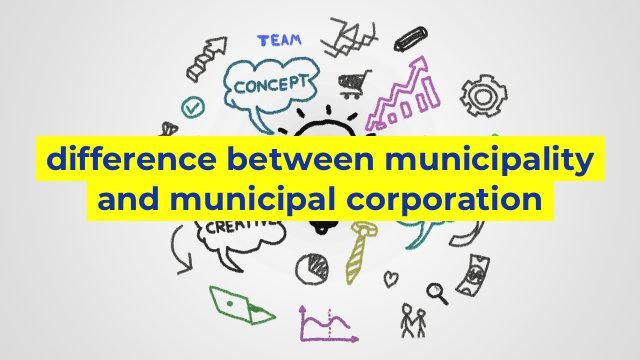The Fundamental Differences between Municipality and Municipal Corporation
Introduction
In India, the terms ‘municipality’ and ‘municipal corporation’ are often used interchangeably in day-to-day conversations, but they are not the same. They are two different bodies of local administration and governance that serve different types of areas. In this article, we will discuss the fundamental differences between a municipality and a municipal corporation.
Municipality
A municipality is a local government body in charge of providing basic amenities and services to a small urban area, such as a town or a small city. The head of a municipality is a municipal commissioner, who is appointed by the state government. The commissioner is responsible for maintaining the town or city’s infrastructure, providing clean water, garbage collection, street cleaning, and other basic services. Municipalities are usually established in areas with a population between 10,000 to 1,00,000.
Municipal Corporation
A municipal corporation is a larger local government body with a wider scope of responsibilities than a municipality. It is formed in larger cities with a population of over one lakh. The head of a municipal corporation is a mayor, who is elected by the people. Municipal corporations are responsible for a larger area and provide a wider range of services compared to municipalities. The primary responsibility of the corporation is to provide better facilities and amenities like water supply, roads, water drainage, and sewage. Municipal Corporations are also responsible for the welfare of the city’s people, such as parks and recreation centers, hospitals, building regulation, and sanitation.
Differences Between Municipality and Municipal Corporation
While municipalities and municipal corporations both deal with local administration, there are fundamental differences between them. The key differences are:
Area of Jurisdiction:
The jurisdiction of a municipality is limited to a small urban area, such as a small town or city. Conversely, a municipal corporation is responsible for a larger area that includes the city and its suburbs.
Authority:
A municipality is headed by a municipal commissioner who is appointed by the state government. In contrast, the mayor of the local government heads a municipal corporation, who is directly elected by the people.
Scope of Services:
Municipalities focus on providing basic services, such as water supply, sanitation, and garbage collection. Municipal corporations provide a more extensive set of amenities and facilities such as hospitals, parks, and recreation centers in addition to the basic services provided by municipalities.
Conclusion
In conclusion, it is essential to understand the differences between a municipality and a municipal corporation to know which local government body is responsible for which services. A municipality generally serves smaller urban areas and provides basic amenities, while a municipal corporation is responsible for larger cities and offers a more comprehensive range of services. It is essential to know which local body governs your area to ensure your needs and concerns are addressed appropriately.
Table difference between municipality and municipal corporation
| Type of Local Government | Key Differences |
|---|---|
| Municipality | Refers to a local government unit that is governed by a council or board of elected officials. It has limited powers and usually only provides basic services such as waste management, street lighting, and public health services. A municipality may be located in an urban or rural area. |
| Municipal Corporation | Refers to a specific type of municipality that has a greater degree of autonomy and powers to provide a wider range of services such as water supply, sewerage, and public transportation. It is usually located in larger urban areas and has its own administrative structure that is separate from the rest of the local government. |


